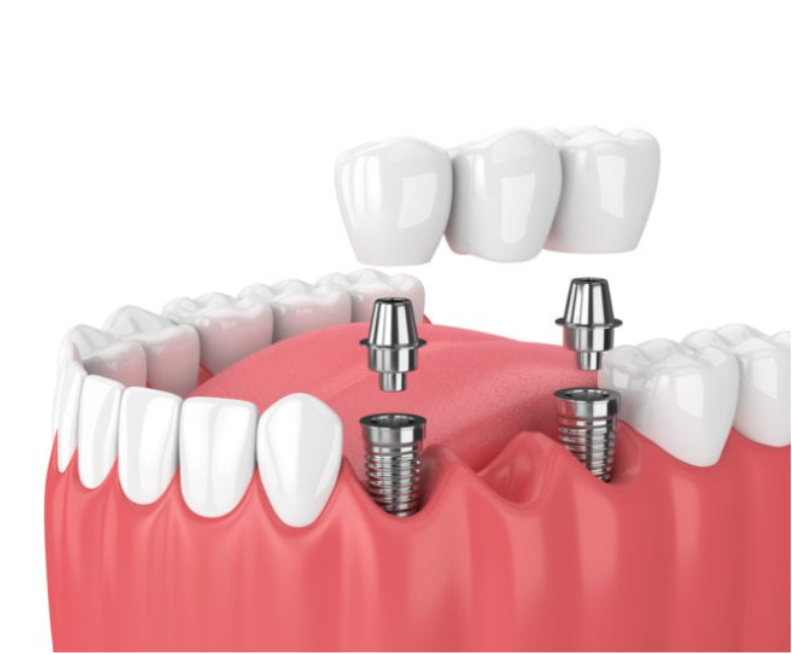Do you have one or more missing teeth? Bridge the gap left by missing teeth with a dental bridge. A bridge is a dental restoration that can use natural teeth capped by dental crowns or dental implants to replace lost teeth. Restorative dentist Dr. Walter Mazzella provides dental bridge treatment in Woodstock, MD to help patients renew the appearance and function of their smiles.

Fixed vs. Implant Bridges
Traditional dental bridges use support from crown-capped natural teeth. Preparing the natural teeth on either side of the tooth gap for crowns ensures that the dental bridge stays fixed. Traditional fixed bridges improve the appearance of the smile with dental crowns, zirconium restorations that look and function like natural teeth. However, bridges do not support the bone and gum tissue left in the missing tooth gaps.
Dental implants provide more durability and strength to dental bridges. Implant-secured bridges do not rely on remaining natural teeth for support. Instead, the dental implant posts fuse with the jawbone and create a stable foundation for the dental bridge.
Dental Bridge Treatment in Woodstock, MD
To begin dental bridge treatment, we clean the smile. If patients want traditional dentures, we will shape the teeth on either side of the gap for their new crowns. We then take a putty or a digital “impression” made with a 3d intra-oral wand scanner. Then, we send the impression to lab technicians, who create the bridge. We will also make a custom temporary bridge for you to wear for a few weeks while the area heals. Finally, Dr. Mazzella will ensure that the bridge looks and feels natural before he attaches the final restoration.
Patients who want dental implants to secure their dental bridges will often have a longer treatment time. Dr. Mazzella will surgically place the implant posts. Then, patients will require four to six months to heal as the implant posts fuse with the jaw bone. However, once patients receive their final dental bridges, they will benefit from longer-lasting restorations and improved bite function.
Dental Bridge FAQs
Dental bridges can replace one or multiple consecutive missing teeth. Learn more.
How long do dental bridges last?
With proper care, dental bridges can last 10–15 years or even longer. The lifespan depends on factors like oral hygiene, diet, the material used, and regular dental checkups. Brushing and flossing around the bridge is essential to prevent decay or gum disease near the supporting teeth. Dr. Mazzella will monitor the bridge’s condition during routine visits.
Is getting a dental bridge painful?
The procedure is generally not painful, as it is performed under local anesthesia. You may experience mild soreness or sensitivity after the abutment teeth are prepared, but this usually subsides within a few days. Over-the-counter pain relief can help if needed. Most patients tolerate the process well and feel much better once their smile is restored.
Can I eat normally with a dental bridge?
Yes, once your bridge is fully placed and you’ve adjusted to it, you can eat most foods. Start with soft foods and gradually return to your regular diet. Avoid sticky or hard foods that could damage the bridge. A well-made bridge should feel natural and restore full chewing function.
Does insurance cover dental bridges?
Many dental insurance plans cover bridges partially or fully, especially if they’re necessary to restore chewing function. Coverage depends on your plan, annual maximums, and whether you’ve met your deductible. It’s a good idea to get a pre-treatment estimate from your insurance provider. We also offer third-party financing options through CareCredit.
Is it possible to get cavities under a dental bridge?
Yes, decay can form around or under the crowns supporting a bridge if oral hygiene isn’t maintained. It’s essential to clean around the bridge thoroughly to prevent bacterial buildup. Using fluoride toothpaste and flossing daily helps protect the supporting teeth. Routine exams allow us to monitor the area for any issues.
Who is a good candidate for a dental bridge?
You may be a good candidate if you have one or more missing teeth with healthy teeth or implants on either side of the gap. Good oral health and bone support are essential for a successful outcome. Dr. Mazzella will evaluate your bite, gum health, and jaw structure before recommending a bridge. If the surrounding teeth are weak, alternative treatments may be considered.
Restore Missing Teeth Today
Are you missing multiple teeth? Try a dental bridge. Schedule your next consultation online or call us at (410) 559-9951 for treatment today.
